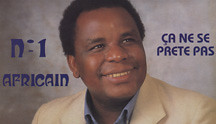
I began buying Congolese records circa 1980. The punk music that had drawn me to New York a few years earlier had succumbed to terminal ennervation, with Kingstonian 'cultural' reggae not far behind it. At the time, an African student dj named Lawrence NiNate (spelling approximate) was broadcasting on Columbia University's radio station in uptown Manhattan; his program, emerging from my bedside radio in Tribeca, had a galvanizing effect on this little honkie. He played all the greats: Franco & OK Jazz, Tabu Ley Rochereau, Kabassele, Dr. Nico et al. The songs were all so good, fully as sensuous - to invoke again a metaphor that has resurfaced more than once in my writing - as the flick of a sperm cell's tail. I didn't want them to stop, and they didn't. The novelty of these extended dance tunes was such that if I found an album from Zaire containing four songs, it would be deemed good enough and I would buy it without question. Of course, nothing was or is that simple. I bought a lot of mediocre music in the course of my pilgrimages to Brooklyn's African Record Centre. I did manage, however, to divine a simple, immutable truth while early in the thrall of listening to Pamelo Mounk'a: If a woman's name ended in "a," chances were Pamelo could spin a deathless tune in homage to her.
No.1 Africain, Pamelo's third solo album helmed by producer Eddy Gustave, is offered herewith as proof. "Tamara, Ndjeu Nkasi A Me" and "Nourama" comprise the B side of this disc, both tunes sporting the earmarks of great soukous music: the horn section jabbing and feigning like a prize fighter; multiple guitar interplay that obliterates the line between rhythm and lead roles, as with the Rolling Stones' best London singles from the mid-'60s; and that genuinely pregnant pause when, after a couple of verses sung to a languid 3+2 Afro-Cuban tattoo, the band shifts into high gear for the extended vamps known as the seben, which form the lion's share of a given song. I live for the seben, when drummer Domingo Salsero plays four-to-the-floor, driving the band towards the horizon without obstacles in sight, red-lining in fifth gear all the while. Master Mwana Congo gets off some rude asides on his guitar, the backing vocalist offers props off-mic to the gentlemen of the orchestra and something like genuine trance music materializes.
What's more, Pamelo's songwriting stricture holds water when soaked overnight. Every woman I've ever met (well, there's a lone exception, whom I'll gladly ignore for the nonce) whose given name ended in the letter "a" has become a luminous, valued presence in my life. Pamelo Mounk'a offers a gallery of these alluring creatures throughout his discography: Selimandja, Nora, Camitina and the penultimate, his 'tresor Hindou,' Samantha, whom we'll meet in a later post. What a guy! What a life! What a cream-colored suit! More's the pity, then, that Pamelo and the late Robert Palmer never met, as both were boulevardiers setting an admirably louche example for the rest of us.
One more of Monsieur Mounk'a's solo efforts will appear next, being the first chapter of his solo career prior to working avec Eddy. Beyond that, other soukous discs will be offered as iterations of my soundtrack for warm weather, Arette Gran Clase tequila, buttery women and hedonism in all desirous forms. Then, in a while, the twin peaks of Pamelo's canon, Pamelo Mounk'a and Samantha. Please stay tuned.
No. 1 Africain
Comments